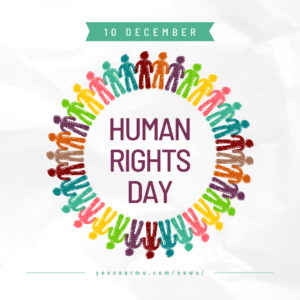We are here looking for exciting and also interesting Human Rights Day Quotes.
Every year on 10 December we celebrate Human Rights Day, which is observed by the international community. On the day established in 1948, the United Nations General Assembly adopted the Universal Declaration of Human Rights. The community at this instant of to making nation happy also healthy relation with each others.
The day’s main aim behind the celebration is to improve social, physical, cultural, and spiritual well-being and welfare. In fact, Human Rights Day stands for not only the fundamental right but also liberties for all people’s humiliations. After all the basis behind this is to acknowledge people about the human rights which are applied in the law.
Lists Of Human Rights Day Quotes
- “Human Rights are not a privilege conferred by the government. They are every human being’s entitlement by virtue of his humanity.” – Mother Teresa
- “Freedom is not worth having if it does not connect and err. It passes my comprehension how human beings, be they ever so experienced and able, can delight in depriving other human beings of that precious right.” – Mahatma Gandhi
- “Commit yourself to the noble struggle for human rights. You will make a greater person of yourself, a greater nation of your country, and a finer world to live in.” – Martin Luther King, Jr.
- “Human Rights for everyone is the necessary foundation upon which all of us may build a world where everybody may live in peace and serenity and plenty.” – Michael Douglas
- “Human rights are inscribed in the hearts of people; they were there long before lawmakers drafted their first proclamation.” – Mary Robinson
- “The only way to make sure people you agree with can speak is to support the rights of people you don’t agree with.” – Eleanor Holmes Norton
- “We believe that human rights transcend boundaries and must prevail over state sovereignty.” – Jose Ramos-Horta
 Human Rights Short Quotes
Human Rights Short Quotes
- “Human rights is the only ideology that deserves to survive.” – Simon Wiesenthal
- “To deny people their human rights is to challenge their very humanity.” – Nelson Mandela
- “Tolerance and human rights require each other.” – Simon Wiesenthal
- “The rights of every man are diminished when the rights of one man are threatened.” – John F. Kennedy
- “Every citizen must protect the rights of others.” – Martin Luther King, Jr.
- “Let us remember: one pen, one book, one child and one teacher can change the world.” Mangala Yousafzai
- “Joy is found when you focus energy on improving human dignity, human capacity, and human value.” – Amit Ray
- “Rise up for the rights!!” Silver Eyes
Human Rights Day is to teach people about their rights, at the same time important as everyone has the freedom to express their thoughts as compared to represent themselves.
Conclusion:
Being that, the Human Rights Day quotes. Hopefully, these quotes inspire and motivate you to protect the rights, as well as be kinship to all human beings. May this post be helpful for your queries.
Please visit our other page International Human Solidarity Day.






Recent Comments